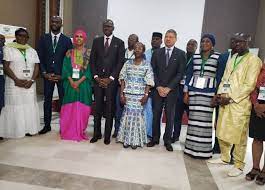Representatives of over a dozen countries in the French-speaking world are meeting in Abidjan over ways to extend the teaching of national languages in their education systems, alongside French.
On Monday 24 June 2024, Anastasie Sepou, the deputy chief of staff representing Côte d’Ivoire’s Minister of National Education and Literacy, opened a workshop to share and appropriate the model for extending bilingual education.
She noted that in Côte d’Ivoire, 37 schools in 11 regions are benefiting from the pilot phase of bilingual education. These are the regions of Sud Comoe, Gontougo, Nawa, Agneby Tiassa, Poro, Montagnes, Bélier, La Mé, Worodougou, Tchologo and Bere.
Drawing lessons from the pilot phase, Côte d’Ivoire is preparing to roll out phase three of the ELAN initiative, which will extend the programme both geographically and linguistically, she said, adding that it will “cover 380 primary schools in 19 regions”.
The deputy chief of staff of the Ivorian Ministry of Education announced that eight other regions would be added, namely the Lagunes, NZi, Goh, Haut Sassandra, Gbeke, Lacs, Kabadougou and Bafing regions. The project will run from 2024 to 2027.
“The vision of deploying bilingual education does not only concern primary education, but in the long term, will also concern secondary education,” she added. The two-day workshop is expected to shape the appropriate model for a successful roll-out.
“In an increasingly interconnected world, where borders are disappearing and cultural exchanges are multiplying, it is essential to preserve and promote the richness of our mother tongues, which reflect the diversity of our cultures and ways of thinking,” she said.
This workshop to share and appropriate the simulation model for the extension/generalization of bilingual education is organized by the Institut de la Francophonie pour l’Education et la Formation (IFEF), in collaboration with the Ivorian Education Ministry.
Speaking on behalf of the Director of the IFEF, Ms. Bodiel Fall argued that education is the cornerstone of a country’s social, economic and cultural development, and the tool par excellence for building a better future.
The ELAN programme should help to improve the quality of education in line with the sustainable development objectives, she said, noting that assessments of pupils’ learning achievements over the past decade have shown that innovative learning practices are needed.
The PASEC 2014 evaluation report, like the one for 2019, also shows an “insufficient level” of literacy and numeracy among pupils in most of the countries concerned, she pointed out, asserting that the development of human capital is intrinsically linked to the language of instruction.
According to UNESCO, 4 out of 10 children in the world are taught in a language they do not understand, and in Africa the figure is 8 out of 10. This calls for an improvement in the education system.
The workshop brings together technical and financial partners, ELAN Africa Programme focal points, planning directors from the ministries of education of the 11 host countries and heads of NGOs working to promote national languages.
The Ivorian professor Saliou Toure was the first to experiment with bilingual education in Côte d’Ivoire in 1990, in Kolia (North).
The workshop was also attended by Jean-Louis Billon, Chairman of the Ivorian National Assembly’s Social and Cultural Affairs Committee.
AP/fss/as/APA


